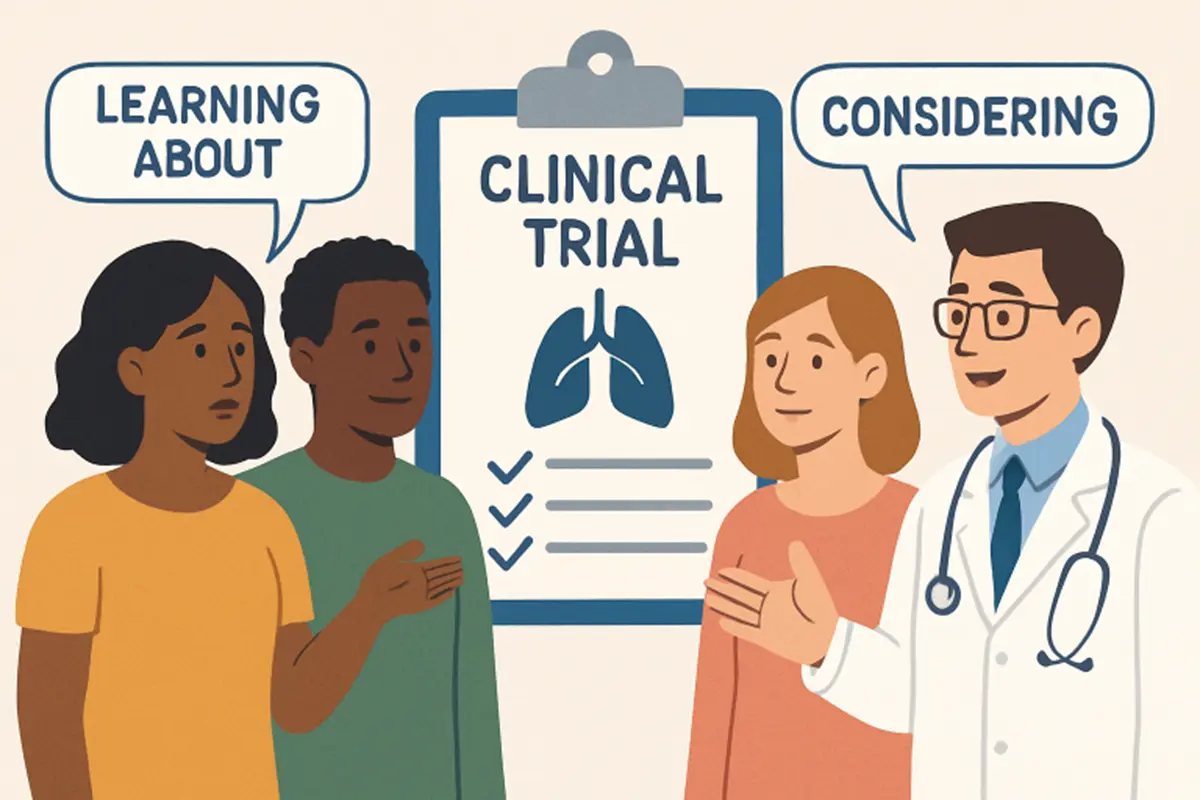Table of Contents
- Understanding Clinical Trials for Lung Cancer
- The Phases of Clinical Trials
- Informed Consent and Patient Rights
- Potential Benefits and Risks
- Types of Lung Cancer Clinical Trials
- How To Find and Enroll in Trials
- What To Expect During Participation
- Latest Developments in Lung Cancer Trials
- Questions To Ask Before Joining
- Conclusion
Understanding Clinical Trials for Lung Cancer
In recent years, clinical trials have played a pivotal role in revolutionizing lung cancer treatment, offering patients hope by testing breakthrough therapies and enhancing long-term outcomes. Clinical trials for lung cancer provide patients with access to new treatments that are not yet available to the general population, paving the way for the development of safer and more effective care.
Lung cancer clinical trials give patients access to new or improved treatments while contributing to cancer research. Understanding the basics, such as eligibility, trial phases, patient rights, and available support, enables individuals to make informed decisions about participation. These trials are carefully regulated studies that test the safety and effectiveness of novel therapies, diagnostic tools, or interventions. While they can offer life-changing opportunities, not every patient is eligible for them. Factors like cancer type and stage, prior treatments, health status, and genetic markers are often considered to ensure both participant safety and reliable results.
The Phases of Clinical Trials
- Phase I:Tests the safety of a new treatment and determines the appropriate dosage.
- Phase II:Evaluates the effectiveness of the treatment and continues to monitor safety.
- Phase III:Compares the new treatment against standard therapies in larger patient groups, assessing effectiveness and monitoring for side effects.
- Phase IV:Conducted after FDA approval to further monitor long-term effectiveness and rare side effects in the general population.
Each phase has its unique goals, and progressing through them is necessary for a treatment to be approved and widely available.
Informed Consent and Patient Rights
Informed consent is a fundamental ethical principle in clinical trials. Before enrolling, participants receive comprehensive information about the study, including its procedures, benefits, risks, and alternatives. According to WebMD, this process ensures that patients fully understand what participation involves and can make an informed decision about whether to join. Signing a consent form is not a contract, and you have the right to withdraw from a trial at any point without affecting your standard medical care. Regulatory bodies and institutional review boards closely monitor ethical oversight and patient protection.
Potential Benefits and Risks
Joining a clinical trial often means gaining access to cutting-edge treatments before they become widely available. Participants may experience improved health outcomes, increased monitoring, and contribute to scientific progress. However, as with any medical intervention, there are risks, including unforeseen side effects or the possibility that a new treatment may not be more effective than standard care. Discussing the risk-benefit profile with your doctor is crucial before participating in a clinical trial.
Types of Lung Cancer Clinical Trials
Clinical trials vary widely in their focus. Treatment trials examine new drugs, surgical techniques, or radiation therapies to evaluate their effectiveness. Prevention trials aim to identify ways to reduce lung cancer risk, while screening trials seek to detect cancer earlier through improved detection methods. Quality of life, or supportive care trials, focus on managing symptoms and improving overall well-being.
How to Find and Enroll in Trials
With growing resources, it’s now easier than ever to search for lung cancer clinical trials. Reputable databases offer robust search tools to match patients with open studies based on cancer type, location, and trial phase. Your oncology team, local cancer centers, and patient advocacy organizations can guide you to opportunities that closely align with your needs.
What to Expect During Participation
Participating in a lung cancer clinical trial typically involves regular check-ups, laboratory tests, and occasionally additional visits, compared to standard care. You may receive extensive monitoring and more support through a dedicated trial staff or nurse navigator. While requirements and schedules vary, researchers aim to minimize the inconvenience to patients as much as possible, and many report positive experiences and a sense of community throughout their participation.
Latest Developments in Lung Cancer Trials
The landscape of lung cancer research is rapidly evolving, fueled by breakthroughs in targeted therapies and immunotherapies. Unlike traditional chemotherapy, which often brings harsh side effects and limited long-term results, these innovative approaches focus on precision and personalization. Targeted drugs that address specific genetic mutations such as EGFR, ALK, and ROS1 have proven highly effective in slowing disease progression and extending survival. Meanwhile, immune checkpoint inhibitors, such as PD-1 and PD-L1 blockers, are revolutionizing care by enabling the body’s immune system to mount stronger, longer-lasting responses against cancer cells. These advancements are significantly improving patient outcomes and offering renewed hope for many facing lung cancer.
Ongoing research continues to build on these successes by exploring new strategies and combinations. Clinical trials are testing how immunotherapy can be paired with chemotherapy, radiation, or additional targeted drugs to enhance effectiveness and reduce treatment resistance. There is also a growing emphasis on introducing these therapies at earlier stages of the disease, where they hold the potential to improve cure rates. With precision diagnostics, cutting-edge treatments, and a focus on earlier intervention, the future of lung cancer care is moving toward more effective, personalized, and durable solutions.
Questions to Ask Before Joining
Before enrolling in a clinical trial, prepare a list of critical questions to ensure you make an informed decision. These might include: What are the expected risks and side effects? How does the study differ from standard treatment? What are the costs, and will insurance cover them? What are the trial’s goals and criteria for success? Understanding the answers to these fundamental questions helps clarify whether participation aligns with your personal and medical needs.
Conclusion
Clinical trials for lung cancer represent both a pathway to innovative treatments and an opportunity to contribute to medical progress that benefits future patients. By understanding eligibility requirements, phases, patient rights, potential benefits, and risks, individuals can make informed choices about whether participation is right for them. With the rapid advancements in targeted therapies and immunotherapies, trials continue to bring new hope to those affected by lung cancer, offering not only access to breakthrough care but also the chance to be part of shaping the future of cancer treatment.




